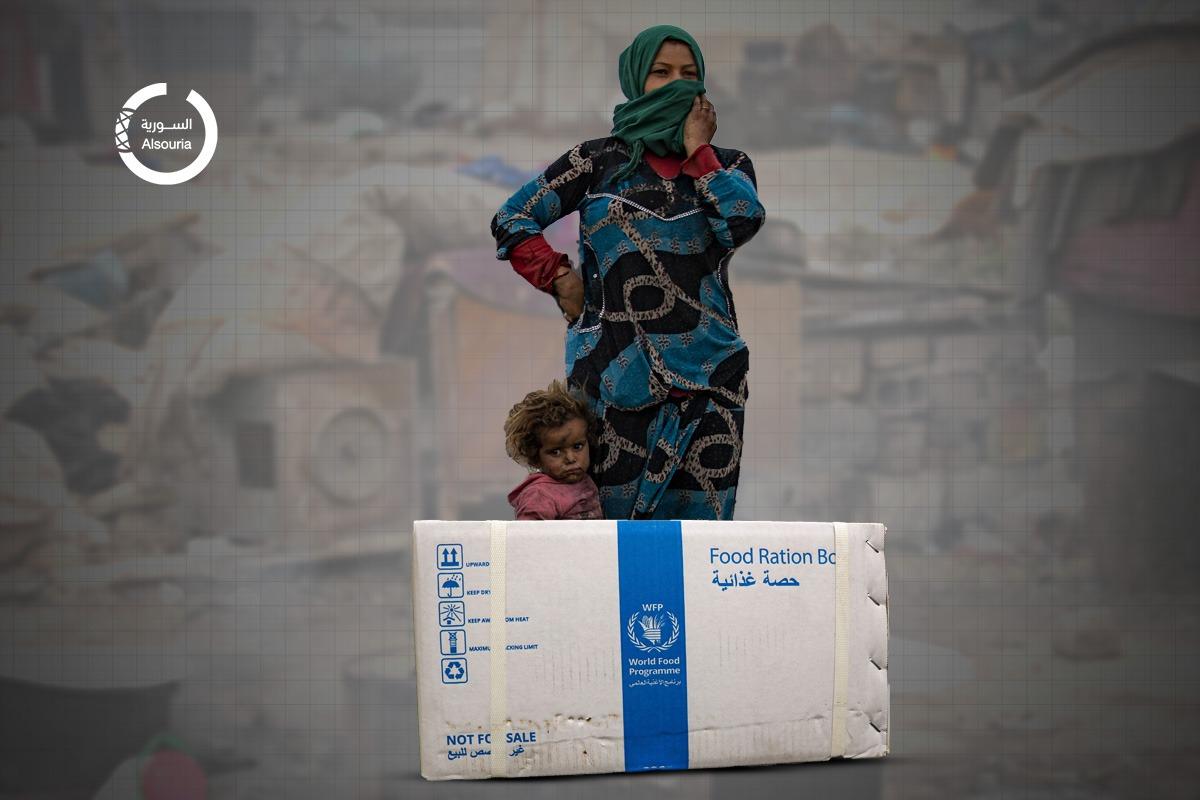In the middle of a cramped tent, repurposed as his makeshift kitchen following his displacement from the village of Babis in the countryside of Aleppo, Mahmoud scrutinizes the scant remnants of the latest food basket he received from the World Food Program via a local organization. He had heard unsettling news of a “sharp reduction” in the aid provided by the UN program, a blow that could potentially deprive him permanently of his monthly lifeline.
Mahmoud Muhammad Jarban, navigating through the tumultuous landscape of displacement wrought by relentless military operations, found himself settling temporarily in the makeshift community of the Commune camps north of Idleb. He had hoped to carve out a semblance of stability amidst the chaos, but the recent revelation had shattered those aspirations. “I was trying to embark on a new phase of stability before this news blindsided me,” Mahmoud lamented, his hopes for a respite dashed once more by the harsh realities of his circumstances.
Thousands of families threatened
Mahmoud, speaking to al-Souria Net, highlighted his unstable income as a freelancer, attributing it to the diminished job prospects resulting from prolonged displacement and instability. He emphasized that the cessation of food aid exacerbates the absence of reliable income sources, compounding the challenges faced.
According to data from partner organizations, Mahmoud’s family is one of 270,000 families reliant on the World Food Program in northwestern Syria. However, they now face the imminent loss of this vital assistance following the World Food Program’s decision on December 23 due to funding shortages.
The WFP has announced the termination of its aid program across Syria citing insufficient funds, sparking uncertainty about whether aid will cease entirely or experience a drastic reduction.
For Ayman al-Jadoua, a displaced individual from the outskirts of Maarat al-Numan, the decision to halt aid came as a shock. He expressed reliance on the food basket for sustenance, emphasizing the inability to afford basic necessities like sugar, rice, flour, bulgur, and oil without it.
Jadoua, among many who lost their livelihoods after displacement in late 2019, relied heavily on agriculture and herding for income. The WFP basket served as a crucial lifeline for his family during this period of instability.
Moataz al-Hawija, another displaced individual from Maarat al-Numan, underscored the financial strain faced by displaced families, compounded by expenses for water and agricultural land in the camps, along with the responsibility for providing health and food services.
Hawija lamented the recent decision to halt food aid, exacerbating the hardships endured by displaced families in Idleb’s camps, amidst worsening living conditions and dwindling employment opportunities.
Interventions in another format
Ahmed Hashem, project coordinator at Ataa, a partner organization of the WFP in northwest Syria, elucidates the grave implications of the program’s recent decision, warning of potentially “catastrophic” outcomes for the local community.
“Since late 2023, partner organizations like ours have been notified of a significant reduction in WFP’s interventions for 2024, transitioning to alternative modes of assistance,” Hashem disclosed to Syria.net.
He continued, “As humanitarian workers directly engaged with vulnerable groups including impoverished, displaced, and disabled families, whose sole means of sustenance often hinges on this aid, the news came as a shock. We understand the far-reaching consequences it will have on the already precarious lives of those displaced and in need.”
Hashem attributed this decision to “a lack of sufficient global support and funding for the program,” expressing disappointment that financial aid fell short of what was necessary to sustain operations in the region and other conflict zones worldwide. He lamented the unlikelihood of reversing this course “due to the persistent funding shortfall.”
Furthermore, he highlighted the inadequacy of coverage, noting that the program originally failed to meet the full extent of northwestern Syria’s needs, despite poverty rates soaring to 90% among the population. He pointed out that the program only addressed approximately 30% of the overall need.
According to Hashem, the suspension of WFP operations in the region will have dire repercussions, primarily due to the acute poverty experienced by beneficiary families, potentially precipitating a looming famine despite the program’s prior efforts, now curtailed significantly.
This article was translated and edited by The Syrian Observer. The Syrian Observer has not verified the content of this story. Responsibility for the information and views set out in this article lies entirely with the author.


